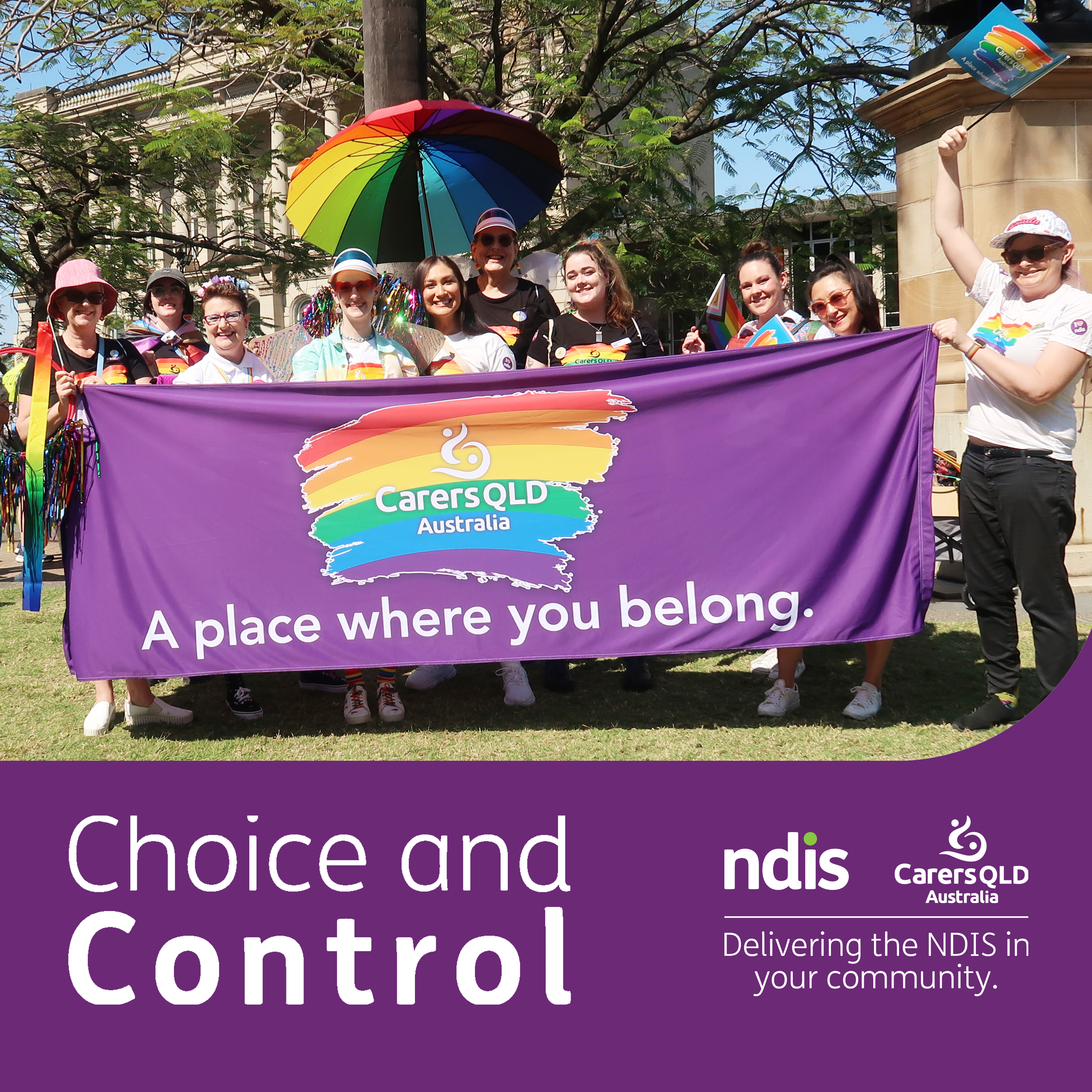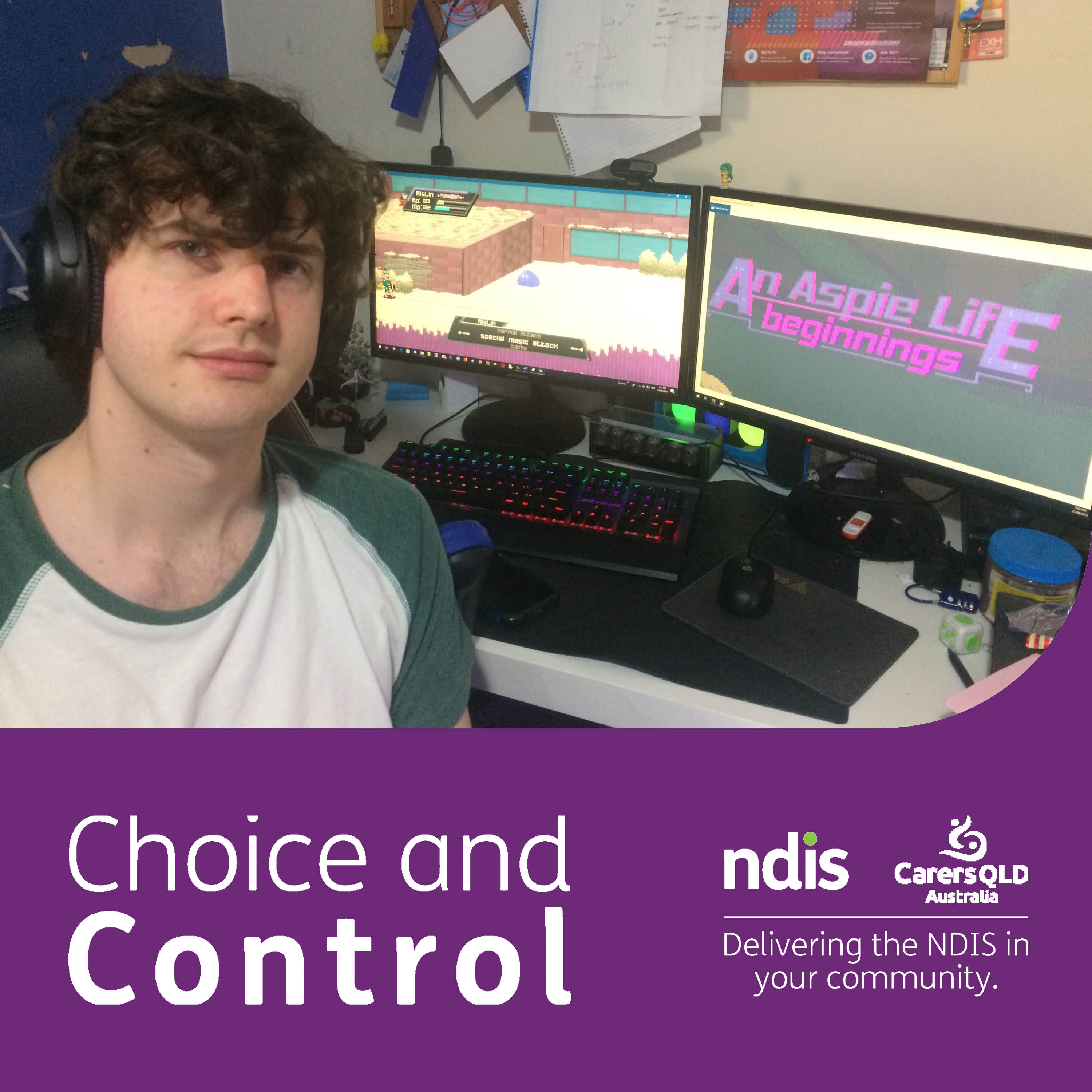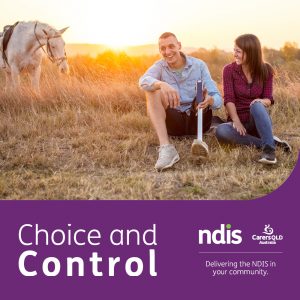Speaker 1 00:00:06 Hello, and welcome to choice and control a podcast. Celebrating the contribution that people with disabilities make to our communities. In this series, we are talking all things, disability, social inclusion, and the national disability insurance game. Throughout this series, you will also be hearing some great practical advice for making the most of your NDA S plan from local people. Accessing the scheme. This podcast series is brought to you by the team at carers Queensland. NBIS local area coordination partner in the community. I'm your host Douglas Connor. Thank you for tuning in today. We have a very special episode for you. We're lucky enough to be hearing from two incredible women who with their families have made Australia their homes in recent years, both women now reside on the gold coast and have family members with the disability receiving supports through the national disability insurance scheme. First we're hearing from Sony.
Speaker 1 00:01:00 So now you came to Australia with her husband. Truco almost six years ago after leaving her home country of Tibet to visit the Dalai Lama in India. The Dalai Lama is the spiritual leader of Tibetan Buddhism, and has been an exile in India since 1959, following a failed anti-Chinese uprising. Many Tibetans see the Dalai Lama as a living God and Sony and troll who wish to visit him in India to pay their respects. Unfortunately, on their attempt to return to Tibet after their visit, they were not really allowed. Entry. Tibet has been a place of political unrest for centuries. And in recent times, Chinese authorities in Tibet, having forced penalties for those who choose to visit the Dalai Lama.
Speaker 0 00:01:42 My name is Sonia <inaudible> and I'm from Tibet, China, the counter, the Tibet. So his holiness, the Dalai Lama, he loves India. So he can't go back to bed. So this way we want to see him this way. We went to India, that dilemma he's our God or present or so this way we just want to see. So when I've been to India, I mean the Dalai Lama. And after that, I tried to go back to tidbit, but then China said, no, you can't come. I went to Nepal and I tried to get Risa. And I went to new Delhi, Todd to get the chain and said, no, you can't
Speaker 1 00:02:23 For Sony's husband troll CU. It was his second time visiting the Dalai Lama with his first trip resulting in a years' jail time.
Speaker 0 00:02:31 First, before married, he went to India, made the Dalai Lama, and then she come back to bed. So then Tina, no, he went to India and then China puts him to jail. One year after one year, he sent it back home, but they said, take the police, come every day and take him and like this. Then he come back again,
Speaker 1 00:02:55 Unable to return to Tibet, Sony and troll crew returned to India before eventually settling in Australia. Sone and her family have now been in Australia for almost six years. And she says that being away from family is the hardest thing to adapt to unaware that her absence from Tibet would be a permanent one. The couple did not have a chance to say a proper goodbye to their loved ones. Sony says that she regularly attempts to contact her family by phone, but worries about getting them in trouble with authorities.
Speaker 0 00:03:22 We don't understand what we do. And I do meet all my family. And I went to India because I just can't. I go to India, I meet the dilemma and come back home. So this way I just went, I didn't meet all my family, my sister and brothers. So it was very sad and it's so difficult, but even I can't talk my family because China, their country Tibet. So that's them, my family, they bought foreman and I spoke and I use the recharge. So Tina come to my house in Tibet. They say, you can't use Richard and you can't talk over the tip of people. You can't talk. And they took my mom's phone and my mom, they took chambers one week. They keep the one week up to the them, send them mom Bay, but they keep my mom's phone. They said, you can't talk anymore to go. His mom is 85 years old. Yeah. She always say, when you come in, when you convey all this, when, when he talked mom, he always say, when you convey
Speaker 1 00:04:33 Sony's husband troll, CU has a physical disability and receive support through the NDIS. So it says that having access to India support has made a huge difference to the life of the family.
Speaker 0 00:04:44 They have lots of duties, not just only took a, you know, they help all family too. Could they take to go somewhere and lots of things? Yeah, no, it's better like a NG. Like they support me and I know some people and yeah, this support, lots of things. Yeah.
Speaker 1 00:05:06 Who'll be hearing from fatigue and Australian born woman of Turkish descent for is the mother of ten-year-old merchant fatigue. I had been living in Turkey for close to 10 years when concerns over merchants, health, and a changing political environment, forced them to relocate back to Australia,
Speaker 0 00:05:24 March on, uh, he's 10, 10 and a half. I should say he was born in Turkey, but he was born healthy, just like I'm a normal child, but when he was two and a half, is that it was just so hyperactive. He would literally climb straight walls. His development skills were really good to his age. It was age appropriate. And then, um, he had an accident, took some aspirin. And, um, I was fortunate, there was an ambulance on site of our complex or another emergency, but they took him and,
Speaker 2 00:05:59 Um, he was in ICU for what, 72 hours. And then after he was discharged, you know, about close to a week, I realized he was not able to use the words he was using, or two, three words at that age appropriate. He was using a lot of, um, body language, um, and making up middle words of his own. And I knew there was something not normal there. People wouldn't understand. They thought I was overreacting as a mother and I took my son to the dogs and I also thought I was overreacting, um, and everything. But when he was in hospital, the, uh, hospital doctor said there might be a bit of oxygen lacking at the time to the brain, but then they didn't take it on further investigations wasn't done. And then I said to my, uh, when he was four, so what, what year and a half later I can see his development was really very behind. And that's when I decided to come back to Australia. Well, one of the reasons why I came back to Australia, because I knew I would be able to find and get the support that he needed
Speaker 1 00:07:11 Apart from ensuring that Merchan received the best support available to him. The other factor in the family's returned to Australia was the changing political situation in Turkey for Tema says that Turkish society, we're seeing a shift back to outdated traditional values that our family didn't agree with.
Speaker 2 00:07:27 Also, another thing was the regime that's currently there. Um, I wouldn't have been heard anyway, even if I had the money and everything, um, it's a very different outlook. It would have been a very different, I wouldn't have got the support. Anyway. It was a title opposite, like 360 degrees opposite to our, um, values and ethics, um, as a family, but not only as a family, um, as a, I mean, I'm Australian born, but the set Turkish, and obviously I have been brought up in a Turkish tradition and cultural families. My parents were educated. My father, um, was a very, um, broadminded. Like my father would help around in the house, you know, duties, how's your vacuum or wash or whatever. And his friend would say, Oh, what are you doing? You know, that's a woman's, well, my wife's working too. So she's contributing to the house. I have to, you know, help her. So it, this is the way we have been brought up. So has my husband, his family,
Speaker 1 00:08:34 The team has said that opposition to the ruling party's politics actually saw her husband lose his business.
Speaker 2 00:08:41 It's the, here's why, or you're in prison. And my husband lost his business because he wasn't part of the regime. He went bankrupt. That's why I'm back here.
Speaker 1 00:08:52 One spec in Sydney for Tema began the search for our diagnosis and support for our son Merchan.
Speaker 2 00:08:58 So I came out here and then my husband came followed on afterwards a year or so after I found a really good neuropsychologist back in Sydney who did a cognitivity test and many other tests as well, and, um, and was diagnosed with high process brain injury. And that's when I started to get some assistance, um, in Sydney, when I, when we moved up to gold coast about four years ago and I took her on again, and then the school was very helpful. Um, and then got onto the services with indice is receiving it psychology speech, you know, professional therapy, but it's basically on his cognitivity and so forth as a family, our goal is to actually get him to able to be able to communicate, um, to able to address his fears, um, to also to be able to be, um, to identify a few things like, you know, what's right and wrong, like bullying and rudeness and mannerism. So we've come across, we've come quite far. Um, you know, to the positive we have achieved just with sort of trying to get onto the academic side now to comprehend. And we're doing that at home as a family.
Speaker 1 00:10:21 Now, living on the gold coast, fatigueness says that merchant is thriving at his new school and working towards achieving his goals.
Speaker 2 00:10:29 He is at Broadbeach public school. He loves it. And I love that school too one. I think it's one of the best schools on the coast with its support networks and the facilities that they have. He's getting a real good support there because of NDI as well. They know about his situation. So he gets that extra support at school as well. So he has speech and language therapy there. He has a psychologist there, a counselor. Um, he also has a one on one teacher for his English and math to help him, um, with the questions when he's not understand. So he's there in class, but it's just focusing on Mack Jones. It's done quite a lot. Yeah.
Speaker 1 00:11:14 Fatina has said that the support offered by the indice had far exceeded her expectations.
Speaker 2 00:11:20 Absolutely fantastic, because I have my own issues to Douglass. So it becomes overwhelming. So when something is happening, I can easily get in touch with Matt John's case workers and so forth and say, look, I need some of this support and I can't do it because of mine. And they're there straight away doing it for me getting it done for me, which that's why I'm very, very happy with the service. I think it's the best thing ever. They've acknowledged children with some disabilities that they need extra support. It's not that they're silly or whatever they need a little extra support.
Speaker 1 00:11:59 You also mentioned that she noticed quite a difference in the way that people with disabilities were perceived in Turkey and in Australia.
Speaker 2 00:12:07 No, I was actually teaching English at a private school in Turkey, and I had two students that were behind in their own peers. But when I used to go to them and do a, teach them and show them things, one on one, they were actually that's it. They can do it. They just get that group thing. So I actually brought that up with the, um, school counselor at the time over, over there. And I, and I said to him, look, you know, we have these kinds of supports in Australia. I know that. Um, is there any support here in Chickasaw? I mean, I wasn't educated in Turkey obviously, so I don't know the whole system and she just laughed at me. She said, this is Turkey. You remember that? Don't you for tumor? I said, yes, I do. But that doesn't mean that we're still living in 1960s or fifties, so they don't recognize it. And then when you start talking to the family, it's very hard for them to accept that there is something wrong because the community, it's what the community thinks. It's not what you think about your family. So it's very different
Speaker 1 00:13:17 For Thomas says that now, after a couple of years, her son Merchan and her husband are both starting to adapt well to Australian life.
Speaker 2 00:13:25 Well, Matt, Jen, um, at first it was quite hard because, you know, he did miss his room, his things, his belongings, um, you know, he has an older brother back there. Um, he does sort of vaguely remembers him. Um, but he didn't, you know, as a child, four years old quickly sort of overcame that. But my husband he's still has difficulties. I mean, he was 60 when he came out to Australia. So it is very, it was very hard, but he's starting to understand and getting, realizing it
Speaker 1 00:13:58 For team has says that access to India support made the transition to Australia a much smoother process for her family, the family, and out together loving life on the gold coast. There are some differences. However, with fatigue lamenting the lack of access to cheap European travel
Speaker 2 00:14:14 Over a weekend, just a weekend getaway. I used to go to grace. I used to go to, you know, neighboring countries and it was like, I remember it was what, 40 euros return ticket, 40 year old, 40 year old. I can't even get here to Coffs Harbor, forget about Sydney or Melbourne.
Speaker 1 00:14:33 That's all for today. And a big thank you to Sony and for Tema, for sharing their stories, the national disability insurance agency, and Karen's Queensland are committed to delivering the national disability insurance game in a way that is sustainable and responsive to the needs of our richly diverse and multicultural nation. Australia is a nation peoples with many languages, ethnic backgrounds, traditions, and religions. We're more than a quarter of Australians were born overseas. More than 300 different languages are spoken by people from called backgrounds. In addition to the hundreds of languages spoken by our Aboriginal and Torres Strait Islander peoples Australians identify with around 300 different ancestries. I hope these stories provided some insight into some of the different ways that the indice is helping to support culturally and linguistically diverse people with disability in Australia.
Speaker 1 00:15:28 I think he wants again for tuning into choice and control the carers Queensland podcast, learn information about carers Queensland, the national disability insurance game, or the local area coordination program. Please connect with us online at Kara's queensland.com today. You or you can catch up with us on Facebook at facebook.com/carers, Queensland indice. We hope this podcast can become a place for people with disability to share their experiences and their stories. So if you have a story that you think we should know about, please contact us by the carers Queensland inquiries line at one 300 triple nine, six three, six, or via
[email protected] until next time. Thanks for listening.


